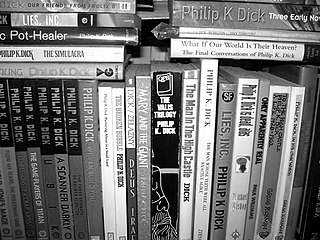Related Research Articles

Blade Runner is a 1982 science fiction film directed by Ridley Scott, and written by Hampton Fancher and David Peoples. Starring Harrison Ford, Rutger Hauer, Sean Young, and Edward James Olmos, it is an adaptation of Philip K. Dick's 1968 novel Do Androids Dream of Electric Sheep? The film is set in a dystopian future Los Angeles of 2019, in which synthetic humans known as replicants are bio-engineered by the powerful Tyrell Corporation to work on space colonies. When a fugitive group of advanced replicants led by Roy Batty (Hauer) escapes back to Earth, burnt-out cop Rick Deckard (Ford) reluctantly agrees to hunt them down.

Philip Kindred Dick, often referred to by his initials PKD, was an American science fiction writer. He wrote 44 novels and about 121 short stories, most of which appeared in science fiction magazines during his lifetime. His fiction explored varied philosophical and social questions such as the nature of reality, perception, human nature, and identity, and commonly featured characters struggling against elements such as alternate realities, illusory environments, monopolistic corporations, drug abuse, authoritarian governments, and altered states of consciousness.

A Scanner Darkly is a science fiction novel by American writer Philip K. Dick, published in 1977. The semi-autobiographical story is set in a dystopian Orange County, California, in the then-future of June 1994, and includes an extensive portrayal of drug culture and drug use. The novel is one of Dick's best-known works and served as the basis for a 2006 film of the same name, directed by Richard Linklater.

Do Androids Dream of Electric Sheep? is a dystopian science fiction novel by American writer Philip K. Dick, first published in 1968. The novel is set in a post-apocalyptic San Francisco, where Earth's life has been greatly damaged by a nuclear global war, leaving most animal species endangered or extinct. The main plot follows Rick Deckard, a bounty hunter who has to "retire" six escaped Nexus-6 model androids, while a secondary plot follows John Isidore, a man of sub-par IQ who aids the fugitive androids.

Timothy Thomas Powers is an American science fiction and fantasy author. His first major novel was The Drawing of the Dark (1979), but the novel that earned him wide praise was The Anubis Gates (1983), which won the Philip K. Dick Award, and has since been published in many other languages. His other written work include Dinner at Deviant's Palace (1985), Last Call (1992), Expiration Date (1996), Earthquake Weather (1997), Declare (2000), and Three Days to Never (2006). Powers has won the World Fantasy Award twice for his critically acclaimed novels Last Call and Declare. His 1987 novel On Stranger Tides served as inspiration for the Monkey Island franchise of video games and was optioned for the fourth Pirates of the Caribbean film.

The Man in the High Castle (1962), by Philip K. Dick, is an alternative history novel wherein the Axis Powers won World War II. The story occurs in 1962, fifteen years after the end of the war in 1947, and depicts the life of several characters living under Imperial Japan or Nazi Germany as they rule the partitioned United States. The titular character is the mysterious author of a novel-within-the-novel entitled The Grasshopper Lies Heavy, a subversive alternative history of the war in which the Allied Powers are victorious.

Valis is a 1981 science fiction novel by American writer Philip K. Dick, intended to be the first book of a three-part series. The title is an acronym for Vast Active Living Intelligence System, Dick's gnostic vision of God. Set in California during the 1970s, the book features heavy auto-biographical elements and draws inspiration from Dick's own investigations into his unexplained religious experiences over the previous decade.
"The Turning Wheel" is a novelette by American science fiction writer Philip K. Dick. It was published in Science Fiction Stories No. 2, 1954.

Hampton Lansden Fancher is an American actor, screenwriter, and filmmaker, who co-wrote the 1982 neo-noir science fiction film Blade Runner and its 2017 sequel Blade Runner 2049, based on the novel Do Androids Dream of Electric Sheep? by Philip K. Dick. His 1999 directorial debut, The Minus Man, won the Special Grand Prize of the Jury at the Montreal World Film Festival.

Paul S. Williams was an American music journalist, writer, and publisher who created Crawdaddy!, the first national US magazine of rock music criticism, in January 1966.
Robert Thurston was a science fiction author well known for his works in popular shared world settings.
Matthew Graham is a British television writer, and the co-creator of the BBC/Kudos Film and Television science fiction series Life on Mars, which debuted in 2006 on BBC One and has received international critical acclaim.

The bibliography of Philip K. Dick includes 44 novels, 121 short stories, and 14 short story collections published by American science fiction author Philip K. Dick during his lifetime.

Radio Free Albemuth is a 2010 American film adaptation of the dystopian novel Radio Free Albemuth by author Philip K. Dick, which was written in 1976 and published posthumously in 1985. The film is written, directed, and produced by John Alan Simon and stars Jonathan Scarfe and Shea Whigham.
David Streitfeld is a Pulitzer Prize–winning American journalist, best known for his reporting on books and technology. During his tenure as book reporter at The Washington Post, he definitively identified Joe Klein as the "Anonymous" author of the 1996 novel Primary Colors, upon which Klein admitted authorship, despite earlier denials.

Scott Brick is an American actor, writer and award-winning narrator of over 800 audiobooks, including popular titles such as Washington: A Life, Moneyball, Cloud Atlas, A Princess of Mars, The Bourne Identity, The Bourne Supremacy, The Bourne Ultimatum, Atlas Shrugged, Sideways, Do Androids Dream of Electric Sheep?, I, Robot, Mystic River, Helter Skelter, Patriot Games, Bid Time Return, In Cold Blood, the Dune series, Ender's Game, and Fahrenheit 451. He has narrated works for a number of high-profile authors, including Tom Clancy, Robert Ludlum, Michael Crichton, John Grisham, Clive Cussler, Stephen J. Cannell, William Faulkner, Nelson DeMille, Brad Meltzer, Harlan Coben, Gregg Hurwitz, David Baldacci, Orson Scott Card, Frank Herbert, Brian Herbert, Kevin J. Anderson, Joseph Finder, Tom De Haven, Stephen R. Donaldson, Nathaniel Philbrick, Terry Brooks, Steve Berry, Gene Wilder, Philip K. Dick, Dennis Lehane, Douglas J. Preston, Lincoln Child, Ayn Rand, Justin Cronin, Carl Hiaasen, Erik Larson, and Isaac Asimov, among others.

"The Crystal Crypt" is a science fiction short story by American writer Philip K. Dick, first published in the January 1954 edition of Planet Stories and later published in Beyond Lies the Wub in 1988.
"The Great C" is a science fiction short story by American writer Philip K. Dick, first published in Cosmos Science Fiction and Fantasy Magazine in 1953. It has since been republished several times in collections such as Beyond Lies the Wub in 1988. Parts of the work, along with Planet for Transients, were later used in the full-length novel Deus Irae. The story is set in a post-apocalyptic world in which a young man is sent from his tribe every year to visit a godlike computer capable of mass destruction and try to stump it with three questions. The story was adapted into an animated virtual reality film in 2018 by Secret Location.
Blade Runner is an American neo-noir science fiction media franchise originating from the 1968 novel Do Androids Dream of Electric Sheep? by Philip K. Dick, about the character of Rick Deckard. The book has been adapted into several media, including films, comics, a stage play, and a radio serial. The first film adaptation was Blade Runner, directed by Ridley Scott in 1982. Although the film initially underperformed at the American box office, it became a cult classic, and has had a significant influence on science fiction. A novelization and a comic adaptation of the film were released in the same year. From 1995 to 2000, three novels serving as sequels to both Blade Runner and the original novel were written by K. W. Jeter, a friend of Dick's. A film sequel to Blade Runner, Blade Runner 2049, was released in 2017. To celebrate the 30th anniversary of Blade Runner in 2012, a short film was released, and in the lead up to the release of Blade Runner 2049, several more short films detailing events that occurred between 2019 and 2049 were released. The influence of the franchise has helped spawn the cyberpunk genre.
References
- ↑ Tarot and The Prisoner. https://web.archive.org/web/20080114015838/http://users.california.com/~eameece/tarotprisoner.html
- ↑ It's a Wonderful Film. Review of It's a Wonderful Life by D. Scott Apel http://www.onvideo.org/features/wonfilm.htm